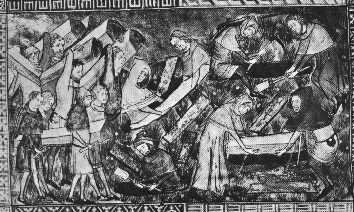 By the 1300s, distinct hierarchical societies were known to be established on most of
the Polynesian Islands. In Southeast Asia, the Siamese invaded Cambodia and the
Muslims established trading with the Pacific islands. In the Americas, the Mayan were
expanding their trade, the Aztecs founded Tenochtitlán. In Spain, The
"Reconquista" had gone far enough to include Toledo, but the Moors still held
Granada for nearly two centuries longer because the Christian states were not yet
consolidated.
By the 1300s, distinct hierarchical societies were known to be established on most of
the Polynesian Islands. In Southeast Asia, the Siamese invaded Cambodia and the
Muslims established trading with the Pacific islands. In the Americas, the Mayan were
expanding their trade, the Aztecs founded Tenochtitlán. In Spain, The
"Reconquista" had gone far enough to include Toledo, but the Moors still held
Granada for nearly two centuries longer because the Christian states were not yet
consolidated.
Technology - Gunpowder in use; paper and silk mills;
wind-driven tower mills. Sluices, locks and weirs; introduction of steel crossbow. Use of
artillery; introduction of plate armor. Water-powered machinery used for the manufacture
of iron and silk in China. In India the department of agriculture was set up, because of
widespread famine.
The spread of the Ottomans - the Ottoman state in Anatolia expanded slowly throughout
the 14th century -- by 1359 all the Byzantine strongholds in Asia Minor had fallen, and
the first conquests in Europe had been made.
John Wycliffe (1329-84) - an anti-clerical English church reformer and bible translator,
whose denial of the doctrine of transubstantiation, shared by his "Lollard"
followers, led to his condemnation as a heretic in 1381. He believed the Latin Bible should be translated into English so the lay people could have access to God's Word.
1305 - The papacy was transferred from Rome to Avignon in the south of France.
1337 - Start of the 100 Years War between England and France.
 1347
- 50 - The Black Death - So called because of the dark patches on the skin in the
early stages of the disease, originated in the steppes of Central Asia, the bubonic plague
traveled the trade routes opened by the Mongols, reaching Constantinople in 1347. By the
end of the following year, it had spread throughout Italy, France, Spain and Portugal, and
had appeared in southern England. The infection was then carried north through Scotland
and Germany, reaching the Baltic in 1350. A few sparsely populated areas were spared, but
overall perhaps a third of the population of Europe perished in this first epidemic.
Scarcely any one ventured to touch the sick, and healthy persons shunned the precious
possessions of the dead as infectious. So deadly was the disease that burial parties such
as the one illustrated were a very common sight throughout medieval Europe.
1347
- 50 - The Black Death - So called because of the dark patches on the skin in the
early stages of the disease, originated in the steppes of Central Asia, the bubonic plague
traveled the trade routes opened by the Mongols, reaching Constantinople in 1347. By the
end of the following year, it had spread throughout Italy, France, Spain and Portugal, and
had appeared in southern England. The infection was then carried north through Scotland
and Germany, reaching the Baltic in 1350. A few sparsely populated areas were spared, but
overall perhaps a third of the population of Europe perished in this first epidemic.
Scarcely any one ventured to touch the sick, and healthy persons shunned the precious
possessions of the dead as infectious. So deadly was the disease that burial parties such
as the one illustrated were a very common sight throughout medieval Europe.
1356 - Golden Bull of Charles IV - gave the government of the Holy Roman Empire largely to
the electors.
1377 - Pope Gregory XI went back to Rome and his cardinals refused to join him and elected
their own pope, Clement VII, who stayed in Avignion.
1368 - China - Overthrow of Mongol Yüan dynasty by national Ming dynasty.
1380 - Russia - Defeat of Tartars by Dmity IV of Moscow at Kulikovo.
1381 - England - Social unrest caused by agricultural depression, peasants' revolted in
England, France and Italy. Bankruptcy of two Florentine banking houses.
1386 - Alliance of Poland and Lithuania under Jagiello.
1390 - Last Byzantine possessions in Asia Minor lost to Turks.
1000's | 1100's | 1200's | 1300's | 1400's | 1500's | 1600's | 1700's | 1800's | 1900's | 2000's
About the Project | The Third Millennium Prophecies | Bibliography | Lessons Learned